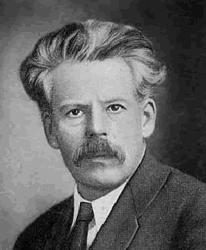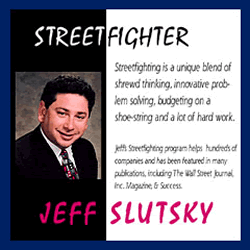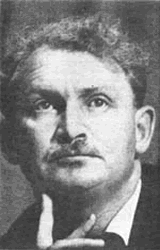Slutsky Family
Click
on Photos to Enlarge
#slty-1
#slty-2
#slty-3
#slty-4
#slty-5
#slty-6
#slty-7
#slty-8
#slty-9
#slty-10
#slty-11
#slty-12

#slty-13:Evgeny Evgenievich
Slutsky
Born: 19 April 1880 in Novoe, Yaroslavskaya guberniya, Russia
Died: 10 March 1948 in Moscow, USSR
After leaving school Evgeny Slutsky entered the University of Kiev in
1899 to study mathematics. He was involved in student politics and he
participated in student unrest at the university.
Student trouble makers were dealt with by giving them a spell in the
army. That is precisely what happened to Slutsky in 1901, but he was
not given a particularly long spell and he was soon back at Kiev University.
The following year he was in trouble again and this time he was expelled
and there was no chance to complete his studies at Kiev.
Slutsky decided on getting an education abroad and he entered Munich
Polytechnikum were he was able to complete a degree and return to Kiev
in 1905. This time he went for course more in keeping with his political
interests, taking a degree in political economics in the Faculty of
Law. He graduated with the Gold Medal in 1911.
From 1913 until 1926 he taught at the Kiev Institute of Commerce, then
in 1926 he moved to the government statistics offices in Moscow. After
eight years there during which time he published important statistical
papers, he began teaching at the University of Moscow. From 1938 onwards
he worked at the Institute of Mathematics of the U.S.S.R. Academy of
Sciences.
As a statistician, Slutsky was influenced by Pearson's work and he was
interested in both the mathematical background of the statistical methods
he studied as well as their application to economics and, later in his
career, to natural sciences.
While at the Kiev Institute of Commerce, Slutsky gave the fundamental
equation of value theory to economics.
Slutsky introduced stochastic concepts of limits, derivatives and integrals
from 1925 to 1928 while he worked at the government statistics offices.
In 1927 he showed that subjecting a sequence of independent random variables
to a sequence of moving averages generated an almost periodic sequence.
This work stimulated the creation of stationary stochastic processes.
He also studied correlations of related series for a limited number
of trials. He obtained conditions for measurability of random functions
in 1937.
Slutsky applied his theories widely, in addition to economics mentioned
above he also studied solar activity using data from 500 BC onwards.
Other applications were to diverse topics such as the pricing of grain
and the study of chromosomes.
Article by: J J O'Connor and E F Robertson
SLUTSKY &
HISTORY
By Martin Malia, Reply by Aileen KellyIn response to The Secret Sharer
(March 9, 2000)To the Editors:As someone with good memories of Boris
Slutsky's public reading of his poetry in Moscow during Khrushchev's
"thaw" of 1962, I appreciated Aileen Kelly's commemoration
of his career [NYR, March 9]. But she goes well beyond this to place
on him a burden of historical interpretation that his stature simply
cannot sustain. For the "dissident" status she assigns him
was stricly a posthumous, post-Soviet discovery—as
in the far more important case of Dmitri Shostakovich.Nonetheless, she
claims Slutsky's example shows Soviet society "was evolving, even
maturingâ€■evidence [that] should be borne in mind by those
who believe the Soviet file should now finally be closed," in the
negative, that is. I am the central example she gives of such insensitive
foreclosure. By contrast, Sheila Fitzpatrick and Stephen Cohen are held
up as defenders of a more open and positive view.To make this dubious
point, moreover, Kelly caricatures my position in terminology taken
from her two authorities' "revisionist" Sovietology. Thus:
I consider Soviet society an "ideological monolith," both
"static" and "all-encompassing" in its social "control."
This monolith was held together by a "logocratic spell" broken
only when the dissident intelligentsia seized the opportunity offered
by glasnost under Gorbachev to carry out Solzhenitsyn's famous injunction,
"Refuse to live according to the Lie." Indeed, the "spell"
was total until 1989-1991, with only up-front dissidents escaping it—a
view "belied by Slutsky's poetry" and supported by the pluralistic
picture of Soviet life Fitzpatrick gives in her Everyday Stalinism.
In short, Kelly objects to my viewing communism in terms of what her
authorities decry as the "totalitarian model."But what alternative
exists to this universally used shorthand for the unique amalgam of
Communist Party-state, command economy, secret police, and mandatory
ideology? For Soviet history was not centrally about workers' power
or overcoming backwardness. It was about "building socialism,"
defined as the suppression of private property, profit, and the market.
And it aimed to achieve this "highest goal of history" through
the liquidation, by "class struggle," of all "kulaks,"
"petty bourgeois" NEP men, "wreckers," and other
"enemies of the people." Thus, under communism, ideology,
though not everything, was the sine qua non distinguishing it from more
prosaic forms of modernization. Nor was the system static. Its culmination
was the Stalinist Thirties, its "maximalist versionâ€■and
defining moment," as Kelly quotes Fitzpatrick's characterization."Totalitarianism"
properly understood thus does not mean the Soviet people were mindless
automatons controlled from a single center. And this was made clear
long before Slutsky or Fitzpatrick by waves of dissident émigrés,
samizdat writers, banned Nobel laureates, and Jewish refusniks.Such
dissent, of course, could not be expressed openly because it would reveal
the Communist emperor had no clothes—which indeed
occurred with Gorbachev's glasnost gamble. But when the system was functioning
properly everyone had to use Party-speak publicly (the archives reveal
that the leaders themselves used it behind closed doors). Hence Solzhenitsyn
preached liberation from the language of "the Lie" as the
first step toward liberation tout court. And real dissent is public—and
perilous—as his example illustrates. Until the collapse
of 1989-1991, therefore, most disaffected intelligensia were closet
cases, cautious "Galileos" as opposed to foolhardy "Giordano
Brunos." So Slutsky confined his protest to writing "for the
drawer."To Kelly's authorities, of course, any suggestion of ideocratic
power acting "from above" is cold war calumny. Soviet development,
rather, was driven by social forces acting "from below." Yet
in making this partially valid point, they transmogrified their predecessors'
position into a straw man called "monolith." In reality, there
is nothing essential in Fitzpatrick's picture of disaffection under
Stalin that was not already highlighted in 1958 by the "totalitarians"'
patriarch, Merle Fainsod, in his Smolensk Under Soviet Rule.Yet "revisionism"
was not just a matter of historical methodology. Its subtext was advocacy
for the enduring legitimacy, founded on "social mobility,"
of the Soviet regime (Fitzpatrick) or anticipation of eventual "socialism
with a human face" (Cohen). These ideological expectations, however,
perversely caused the revisionists to get the Soviet dynamic backwards:
they mistook the post-Stalin loosening of the system for liberalization,
when in fact it denoted decomposition leading to collapse. Communism
as ideocracy can readily account for this outcome: no Lie, no system.
Social maturation, however, draws a blank. For if Soviet society was
"evolving" as nicely as Kelly and her authorities maintain,
then why is it not still there? Surely, this is the overriding historical
problem posed by the surreal Communist epic—not the
now pointless celebration of Soviet "pluralism."Martin Malia
Berkeley, CaliforniaAileen Kelly replies:Some of Martin Malia's comments
on my review make me wonder whether he has read it or just been told
about it by friends. For example, he does not need to insist that Slutsky's
"dissident" status was "a strictly posthumousâ€■discovery":
this fact, and the reasons for Slutsky's conformism, were at the heart
of my piece. Unlike Malia, however, I don't believe that this external
conformism automatically detracts from the quality of Slutsky's insights
into the workings of Soviet society. What does it mean to say that Shostakovich's
case was "far more important"? That his music conveys a sense
of his tragic age far better than Slutsky's poetry? A debate on their
relative merits could be interesting, but Malia is apparently not concerned
with my discussion of Slutsky, which he seems to interpret as a mere
pretext for the real subject of my review—a veiled
attack on Malia's own views about the Soviet system.His suspicion is
based on just two points at which I suggest that Slutsky's portrayal
of the evolution of Soviet society is relevant to a continuing debate
among US academics on the nature of the regime. In this debate Malia
currently has a high profile, thanks to his recent book, Russia Under
Western Eyes, and his New York Times polemic with Stephen Cohen: hence
my reference to both men by name. Malia's reaction to my summary of
the positions expressed in their publications reminds me strongly of
the ideological origins of these polemics in cold war passions, when
the fervent anticommunists of the "totalitarianism" school
did not hesitate to question the intellectual independence and integrity
of those whom they suspected of any sympathy with the opposing camp.The
authentic flavor of this polemical style (one of the last legacies of
the Soviet period) is conveyed by his incantatory references to the
"revisionist authorities" whose mouthpiece he believes me
to be. He includes among them Sheila Fitzpatrick, despite the fact that
I criticized her for downplaying Stalinism just as the "totalitarianism"
school downplayed de-Stalinization. Although he may not have intended
it, he gives the impression of believing, in the style of Lenin, that
all "revisionists," however much they may appear to disagree
among themselves, are in secret collusion against the one true version
of history.I argued that the discovery of Slutsky's rich picture of
Soviet society should make us more wary of all prescriptions or predictions
about Russia's future that ignore or underestimate the complex heritage
of her recent past. Malia dislikes the implication that he is guilty
of such an insensitive foreclosing. He is not, as it happens, the main
target of this remark, but the attitude I had in mind is well illustrated
by his claim in Russia Under Western Eyes that with communism's collapse
"the reputedly world-historical turning of October was annulled
and all its results were repealedâ€■. It was as if 1917 had
never occurred." (p. 406)He complains that I use the standard terminology
of my "authorities" to caricature his views. Here his memory
seems to have let him down somewhat: as demonstrated in his book, the
following terminology to which he objects is his own. The reference
to a "logocratic spell" broken by Solzhenitsyn's injunction
is on p. 407 (see also p. 397); on p. 309 Soviet Marxism is described
as an "all-encompassing state tyranny."I do not think I have
caricatured any of Malia's views, but his method of ideological typecasting
certainly caricatures mine. While I do not share his belief that the
Soviet Union was brought down by a tiny number of dissidents, I have
never attributed to him or to any other historian the absurd view that
the party-state had turned most of its citizens into automata. I merely
think he takes far too little account of the cumulative results of the
disillusionment and disaffection of ordinary Soviet people over seven
decades. I have never held the view that Soviet Russia was evolving
"nicely," which is why I was so impressed by Slutsky's portrayal
of its last years as a society adrift, searching for direction with
only the experience of past tragedy and past errors to guide it.Malia
refers to Slutsky's poetry and the testimonies collected in Fitzpatrick's
volume simply in order to claim precedence for the "totalitarianism"
school as having been the first to tap such sources. It is depressing
to see these firsthand accounts of often terrible experiences being
used to refuel old ideological disputes which are increasingly meaningless
to new generations. We would do better to learn from these testimonies
what Slutsky learned: that ideologies are disastrously incapable of
explaining historical processes and moral experience.
The Jewish News recently spoke with author/producer/music supervisor
Allan Slutsky about his dedication to the project, his partnership with
producer/director Paul Justman and producer Sandy Passman, his own musical
experience and his Jewish background.JN: What first sparked your interest
in Motown music?AS: This has been a 35-year odyssey. I’m
50 now. In the ’60s, when I was 15 years old, I was
in a group called The Majestics. I was the lone white, Jewish guy in
an all-black band, which was kind of crazy at the time because all my
friends were into rock, you know, Hendrix and The Who.And I was a soul
man. I used to play these clubs deep in the heart of Philly’s
black neighborhoods. [Motown] is the music that I played. This was the
music of my youth.
JN: Most people have never heard of the Funk Brothers. What initially
drew you to their story? How were you first introduced to these virtually
anonymous musicians?AS: I’m a professional musician.
I went to Berklee [College of Music] in Boston and I had a company called
Dr. Licks Publications, which I started in the early “80s.
I transcribed guitar solos note for note from famous guitarists and
I would sell these to a publisher named Hal Leonard.I decided to write
a book called The Art of Playing Rhythm and Blues. It was a survey of
the most famous R&B scenes of the ’60s; Chicago,
New Orleans, Philly, Motown.When I started researching [the Motown section
of the book], and started transcribing in particular James Jamerson,
the [Motown] bass player — those bass lines! —
I went out of my mind. Listen to this stuff. I had never listened to
it with that critical of an ear when I was younger.The book [Standing
in the Shadows of Motown] started when I was in Chicago at [a music
industry trade show]. I had the idea to try to find Jamerson’s
widow since Chicago’s right next to Detroit.So I went
to Detroit and called the musicians union. They gave me her number.
I hooked up with her to discuss the possibility of doing a book. She
started taking me around to all the other members of the Funk Brothers
who were telling me all these incredible stories about James.
JN: At that point, did you realize what a big project it would turn
into?AS: Well, I thought, “Man, there’s
a little bit more here than a book.� Also, I had never
written a real book. I had always written technical books. But I got
obsessed with the story.And next thing I knew — three
years later — I had spent about 10,000 hours and $60,000-some
writing the book.The book came with two CDs. And on the CDs I had enticed
everyone from Paul McCartney on down — every major
bass player in the world — into playing excerpts from
James Jamerson and talking about him and the influence that he had on
their careers.
JN: Did you suspect at that point that this would be an important contribution
to music history?AS: I didn’t know what I had done.
It was like an act of desperation. It was crazy. I was totally dead.And
the next thing I know, the book wins the Rolling Stone-Ralph J. Gleason
Award for Book of the Year in 1989. I was floored.There’s
an old saying: “A little bit of success can be a dangerous
thing.� I guess I got a swelled head. I hadn’t
taken myself seriously until I won that award. Then I thought, “There’s
a movie in this.� That set me up for 11 years of searching
for funding on a full-time basis. It wasn’t part time.
Every day I would work on it from six to 12 hours.
JN: It took that long to drum up interest or support?AS: I made over
1,000 pitches during those years. We got close a few times. But I was
a pretty angry guy.Do you know the story about how Schindler’s
List got made? There was a tailor in L.A., and he would pitch the story
to every movie type who came into his place. [No one was interested]
until one day Steven Spielberg walked in.Obviously, Motown is not at
the level of the Holocaust, but I knew I had an unbelievable story and
I couldn’t get anyone to listen to me. From hanging
out in South Philly, I got a bit of what they call “Italian
Alzheimer’s disease�: You forget everything
but a grudge. So I used anger as a motivating force.The level of disrespect
shown to these guys! These guys created such monumental stuff and nobody
would give them a break.
JN: At what point did it start to seem possible that the film would
actually get made?AS: Well, I had momentary doubts going into the ninth
and 10th years. After I won the award, I got a certain amount of legitimacy.
So for six years or so, I was given carte blanche to run around.But
after about the sixth year, I became like the crazy aunt in the attic.
It was like, “Oh, there’s Slutsky
talking about his stupid film again.� And nobody ever thought
it would happen.What I’ve learned in the journey is
that it’s a miracle any independent films happen.
Everything works against you.
JN: When you finally got around to filming these musicians, what surprised
you the most?AS: The musicianship. My biggest fear was whether or not
the guys could still play. Half the band’s in their
70s. But when they actually sat down, they were incredible. They’re
my heroes.Uriel Jones needed quintuple bypass, which he didn’t
tell me at the time. [Bassist] “Pistol�
Allen [who passed away in the summer of 2002] was dying of cancer and
he didn’t tell me about that either. One of the guys
had lifelong polio, which was hitting him harder in his old age. There
were various infirmities: high blood pressure, diabetes.You could just
see that they had made a conscious decision to get their story out.
They refused to give in. And that was the most amazing thing to me.
JN: There’s a moment in the film when the Funk Brothers
go to England and unexpectedly receive the star treatment. They’re
considered icons there. But in the U.S., they’re almost
completely unknown. What does that say about Americans as consumers
of pop culture?AS: If you want to see total adulation, go to [the Web
site] soulfuldetroit.com.In England, there’s a club
called the Northern Soul Movement. It’s an obsessive
group of approximately 20,000 record collectors whose only interest
is obscure Detroit music and Motown.[The Funk Brothers] are worshipped.
Motown was always bigger in England than it was here.JN: Do you have
a favorite moment in the film?AS: I have a couple. One of them is in
the end. We’re doing “Ain’t
No Mountain High Enough,� and the choir comes in. There’s
a shot where you see both drummers. It’s just before
the credits roll.And you see “Pistol�
Allen, who is no longer with us, and you see the look on his face. And
the look says, “I’ve waited my entire
life for this moment and it’s here.�He
was dying of lung cancer, and his face radiates the most incredible
joy you can imagine. It’s as if you can tell in that
moment he knows he might be dying, but he’s going
to be remembered. That one hit me the hardest.
JN: In addition to writing the book and being one of the film’s
producers, you also transcribed and adapted the musical arrangements
and played guitar in the film. How did all these roles overlap?AS: We
all had a gazillion jobs. It being an independent film, I was holding
down about 12 different jobs. For me, the musical part was logical because
I had transcribed every one of these Motown songs. I knew every note.I
had to re-teach these guys what they had played 40 years before. Forty
years later, they’re different musicians. But nobody’s
interested in what they play like now.It’s kind of
arrogant to think that I’m going to teach these masters.
But the way that they had always approached their music, it was like
disposable music. They each went in, played, got a paycheck and split.
They didn’t sit there — like this
white Jewish kid — to obsess on every note. They played
it, and it was on to the next tune.JN: Tell me more about your Jewish
background. Do you think that being Jewish influenced you in your drive
to tell this story?AS: That’s something I’ve
given a lot of thought to over the years. From a very young age I worked
with my father. I was always around black people way more than the average
white kid was.In Philly, there were always a lot of Jewish businessmen
working in the ghetto. They had variety stores, clothing stores. My
father was in the cigarette-vending business.The mob controlled all
the “good� neighborhoods. My father,
being an independent, had to go into the worst parts of the city to
do his business. The mob didn’t want any part of that.
It was too dangerous.But there was a history in my family of a lot of
interaction with African-Americans. My grandparents were very, very
religious. And my father was always willing to help people out. In the
Jewish religion, it’s called tzedakah.I don’t
think that I was consciously thinking about that, but it was the way
I was raised. My parents did a good job on that end.
JN: So, in a way, the film itself is tzedakah?AS: I think so. Really,
the film has to make a $10-million profit just for me to break even.
I knew I probably wasn’t going to make money on this.
It was more an affair of the heart.Whether I have a Don Quixote complex
or what, I took it upon myself to help [the Funk Brothers] get their
dream.
JN: Was that also the case for your partners?AS: Definitely. [Director/Producer]
Paul Justman and [Producer] Sandy Passman were heroes. Paul was in this
about 11 years; Sandy, six years. That’s a long time
for people to hang in there and fight against overwhelming odds. I can’t
say enough about them.As far as the Jewish connection between me, Paul
and Sandy: When we were trying to come up with a management name, we
would sometimes kid around and jokingly call ourselves “Three
Jews Management� or — you know the old
Louis Jordan song “Five Guys Named Moe�?
— we thought about calling ourselves “Three
Guys Named Moishe.�
JN: How about your musical training? Did being Jewish influence you
there, too?AS: In addition to everything else I’ve
done, I’ve probably played 2,000 Jewish weddings and
bar mitzvahs. I’ve played these songs over, and over,
and over, and over.Every bar mitzvah band has its obligatory Motown
medley. It’s all part of my background.
JN: It must mean a lot to you to have your dedication to the Funk Brothers’
story pay off.AS: Exactly. The only musical phenomenon of the last 40
years that was as big as the Beatles is Motown. And every single story
from Motown has been told and retold and exploited over and over.Berry
Gordy borrowing $500 dollars — you’ve
heard that story a million times. This was the first new story.Suddenly,
we pop up and say, “Guess what, fellas, you didn’t
know 50 percent of the story.�The way the Motown story
has been marketed all along — it’s
the Temps, it’s the Supremes, it’s
Stevie, it’s Marvin. To me, the Motown story is the
story of a dozen musicians and a cast of revolving vocalists.That’s
the Motown story to me. But, then again, I’m a musician.
JN: So did the film live up to your expectations? Did you achieve your
goal? AS: My belief with this film was all we had to do was not screw
it up. We had the greatest story in the world. We just had to let [the
Funk Brothers] tell their story the way they remembered it and get the
hell out of the way. And that’s basically what we
did. In a couple places they get some braggadocio; they’re
strutting their stuff. Well, they’re entitled to it.
They stood in supermarkets with their music playing overhead and people
in the checkout lines are snapping their fingers or singing to it. And
these people don’t know they’re
standing next to the guy who played on it. They’ve
had enough years of aggravation, and anonymity, and obscurity. It takes
its toll. The fact that they’re finally getting their
due now is a great thing. If this film gets them into the Rock and Roll
Hall of Fame — Jamerson already got in last year —
or if maybe the soundtrack wins them a Grammy, it’ll
be a good thing. It’ll be a mitzvah.



